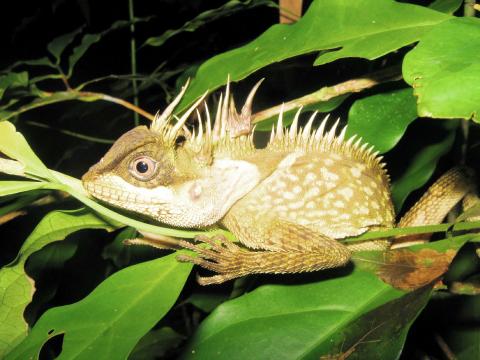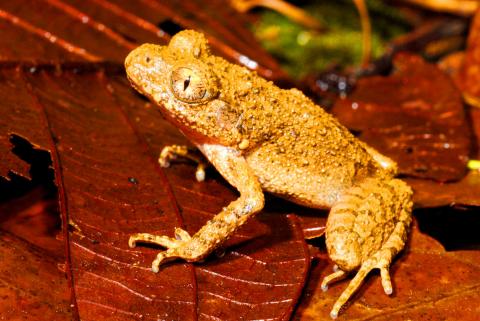A rainbow-headed snake, a tiny frog and a lizard with dragon-like horns are among more than 150 new species confirmed by scientists last year in the ecologically diverse, but threatened Mekong region, researchers said yesterday.
Winding its way from the Tibetan plateau through the mountains and jungles of Southeast Asia, the Mekong River helps sustain one of the most diverse regions on the planet.
Each year scientists announce new species, after an often lengthy identification process, highlighting how much more there is to learn about the region.

Photo: AFP / Montri Sumontha
However, there are fears many species may die out before even being discovered in an area of the world that is rapidly developing, where rule of law is notoriously shaky and wildlife smuggling rampant.
“The Greater Mekong region is a magnet for the world’s conservation scientists because of the incredible diversity of species that continue to be discovered here,” said Jimmy Borah, from the WWF’s Greater Mekong team. “They are racing against time to ensure that these newly discovered species are protected.”
The Greater Mekong region — which includes southwestern China, Vietnam, Cambodia, Laos, Thailand and Myanmar — is under intense pressure from dam and road building as well as a thriving illegal wildlife trade, much of it centered around the lawless Golden Triangle area where the latter three meet.

Photo: AFP / Australian Museum / Jodi Rowley
“Many collectors are willing to pay thousands of dollars or more for the rarest, most unique and most endangered species,” Borah said.
In total, scientists described 163 new species last year, including nine amphibians, three mammals, 11 fish, 14 reptiles and 126 plants.
Among the most eye-catching are Parafimbrios lao, a snake found in the limestone karsts of northern Laos whose scales reflect rainbow-like colors around its head.
On the Thai island of Phuket, which has seen huge development in recent decades, scientists found a lizard (Acanthosaura phuketensis) with a fearsome-looking ridge of horns down its head and back.
And in the country’s northern Chiang Rai Province researchers found a newt (Tylototriton anguliceps) with dazzling red and black markings that they likened to a Klingon’s head from the Star Trek franchise.
In Cambodia and Vietnam, a new frog species, Leptolalax isos, that at 3cmlong, could fit on a fingertip was also discovered.
It was first spotted in 2006, but peer-reviewed confirmation that it was indeed a new species took nearly a decade.
Between 1997 and last year there have been 2,409 new species described in the Greater Mekong, the equivalent of two new discoveries a week.

Nauru has started selling passports to fund climate action, but is so far struggling to attract new citizens to the low-lying, largely barren island in the Pacific Ocean. Nauru, one of the world’s smallest nations, has a novel plan to fund its fight against climate change by selling so-called “Golden Passports.” Selling for US$105,000 each, Nauru plans to drum up more than US$5 million in the first year of the “climate resilience citizenship” program. Almost six months after the scheme opened in February, Nauru has so far approved just six applications — covering two families and four individuals. Despite the slow start —

MOGAMI-CLASS FRIGATES: The deal is a ‘big step toward elevating national security cooperation with Australia, which is our special strategic partner,’ a Japanese official said Australia is to upgrade its navy with 11 Mogami-class frigates built by Japan’s Mitsubishi Heavy Industries, Australian Minister for Defence Richard Marles said yesterday. Billed as Japan’s biggest defense export deal since World War II, Australia is to pay US$6 billion over the next 10 years to acquire the fleet of stealth frigates. Australia is in the midst of a major military restructure, bolstering its navy with long-range firepower in an effort to deter China. It is striving to expand its fleet of major warships from 11 to 26 over the next decade. “This is clearly the biggest defense-industry agreement that has ever

DEADLY TASTE TEST: Erin Patterson tried to kill her estranged husband three times, police said in one of the major claims not heard during her initial trial Australia’s recently convicted mushroom murderer also tried to poison her husband with bolognese pasta and chicken korma curry, according to testimony aired yesterday after a suppression order lapsed. Home cook Erin Patterson was found guilty last month of murdering her husband’s parents and elderly aunt in 2023, lacing their beef Wellington lunch with lethal death cap mushrooms. A series of potentially damning allegations about Patterson’s behavior in the lead-up to the meal were withheld from the jury to give the mother-of-two a fair trial. Supreme Court Justice Christopher Beale yesterday rejected an application to keep these allegations secret. Patterson tried to kill her

North Korean troops have started removing propaganda loudspeakers used to blare unsettling noises along the border, South Korea’s military said on Saturday, days after Seoul’s new administration dismantled ones on its side of the frontier. The two countries had already halted propaganda broadcasts along the demilitarized zone, Seoul’s military said in June after the election of South Korean President Lee Jae-myung, who is seeking to ease tensions with Pyongyang. The South Korean Ministry of National Defense on Monday last week said it had begun removing loudspeakers from its side of the border as “a practical measure aimed at helping ease